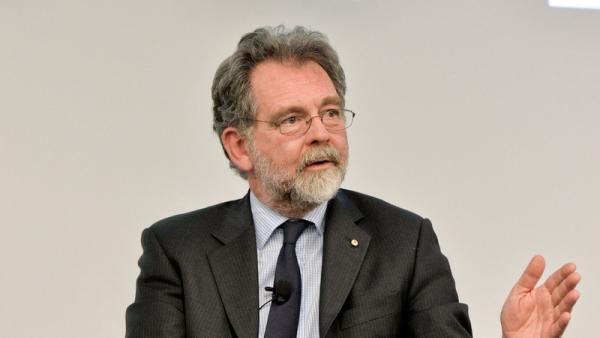UTS:ACRI

Wanning Sun, Deputy Director, UTS:ACRI; Professor of Media and Communication, Faculty of Arts and Social Sciences, UTS |
This article appeared in Crikey on January 28 2025.
On AUKUS, the Liberals and Labor form a united front, which is why the topic is conspicuously missing from the election agenda. To date, the only party that has explicitly declared its opposition to AUKUS is the Greens.
But for strategic policy thinker Hugh White, AUKUS is nothing but a ‘vague idea’; all ‘talk and no action’. Beyond AUKUS, an unreflective and inflexible foreign policy is dangerous and potentially catastrophic. In a wide-ranging interview last week with a host from Neutrality Studies, a policy research group based in Japan, he strongly expressed this view.
Currently emeritus professor of strategic studies at the Australian National University, White served as an intelligence analyst with the Office of National Assessments (now the Office of National Intelligence) and as a senior adviser to defence minister Kim Beazley and prime minister Bob Hawke. From 1995 to 2000 he was deputy secretary for strategy and intelligence in Defence, and was the inaugural director of the Australian Strategic Policy Institute (ASPI).
Over the past couple of years, White has been known as one of Australia’s best-informed and most outspoken critics of AUKUS, the trilateral nuclear-powered submarine deal between Australia, the United States and the United Kingdom that may cost us an estimated $368 billion.
White has no shortage of critics. Some in the security establishment see him as part of the ‘China lobby’. Peter Jennings, the previous executive director of ASPI, describes White’s thinking as ‘misplaced’ ‘China defeatism’.
But it would be wrong to label White a panda-hugger. It would be equally wrong to assume he hates the US.
In fact, few can contest his credentials as a serious strategic realist. His thinking is not based on the international order Australia has been living under, but on the order currently emerging as the power dynamics between the US and China face profound change.
The ‘China threat’
In his interview with Neutrality Studies, White argues that Australia’s foreign policy thinking is not only out of date but also out of place. Indeed, he doesn’t think much sophisticated strategic thinking is occurring at all in this sphere.
On how exactly China’s rise might threaten Australia, White believes it’s not China’s rise per se that is of concern, but rather Australia’s reaction to how it is dramatically transforming the geopolitical order, where the US is no longer the sole hegemon. The ‘China threat’ is thus less a direct threat and more a deep-seated insecurity about what’s coming.
This insecurity, in his view, stems from Australia’s long-standing belief that we would not be able to independently defend ourselves and hence must always rely on a powerful ally. But White is worried that aligning ourselves too closely with the US is dangerous. Should America go to war with China, he believes Australia would follow. However:
I don’t think it’s a war that America can win, and attempting to fight it would actually destroy the very thing that it was trying to preserve. I also think it’s very likely that that war would become a nuclear war, which would be catastrophic in every sense.
White criticised Australian foreign policy for its confusion about geography. Even though Australia is part of the Asia-Pacific, our leaders’ strategic thinking vis-à-vis China, he argues, is fundamentally different from our Asian neighbours, who know how to live with and manage a powerful China.
Inconsistencies in Foreign Affairs Minister Penny Wong’s rhetoric also cops criticism from White. He argues Wong makes a great show of saying Australia is drawing closer and closer to our South-East Asian neighbours, but has also effectively declared that America’s objectives are our objectives.
To White, the AUKUS agreement is a potent symbol of that commitment. But Washington has not recognised the reality that ‘it’s not prepared to bear the costs and risks of confronting countries as powerful as China over the decades to come’, he argues, and thus Australia should not be seeking nuclear-powered submarines from the US.
Instead, America should find a way to ‘stay in Asia to balance China, but without exercising primacy’.
USA, all the way
The problem in Australia’s foreign policy thinking is the ‘absolute consensus behind the support for the US on both sides of politics’ White argues. Labor is just as committed to supporting America as the Coalition, and there is no effective foreign policy debate either inside or outside political circles. For this reason, White admits he is ‘pessimistic about the prospects for a significant change’ in foreign policy direction.
Apart from these arguments, White also reminds foreign policy leaders to stop seeing our Asian neighbours as potential allies for Australia, while failing to recognise their agency. Pondering, if not predicting, the possible eventual rise of India and Indonesia, White reminded us that these countries do not exist simply to be Australia’s strategic allies in counteracting China’s influence.
White also challenged the national imagination of Australia as a European nation stranded alone, surrounded by potentially powerful Asian neighbours, reminding us that Australia is now home to many thousands of Indian and Chinese migrants — the two biggest non-Anglo diaspora communities in Australia. In other words, Asia is not outside as it is already within and a part of us.
There’s irony in this reality:
We are becoming a more Asian country, and so we should in a sense be becoming more comfortable with these things. In fact, as the shock of China’s rise and challenge has hit home to us over the last decade or so, we’ve become more uncomfortable with the idea of living in an Asia dominated by powerful Asian countries than we were 30 or 40 years ago.
This observation carries an important implication. Rather than regarding diaspora communities as entities to be managed and scrutinised as potential threats to national security, we should see them as potential indispensable assets in Australia’s efforts to ‘draw closer to Asia’ (in White’s words), and to help us forge economic, cultural and strategic engagement with the continent.
A realist’s words may not be what our national leaders want to hear. But they seem important food for thought for anyone genuinely concerned about Australia’s national security.
Author
Professor Wanning Sun is Deputy Director at UTS:ACRI and a Professor of Media and Communication in the Faculty of Arts and Social Sciences at UTS.


